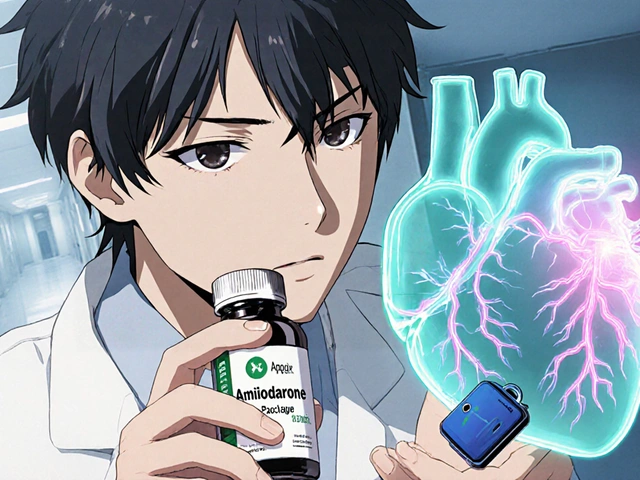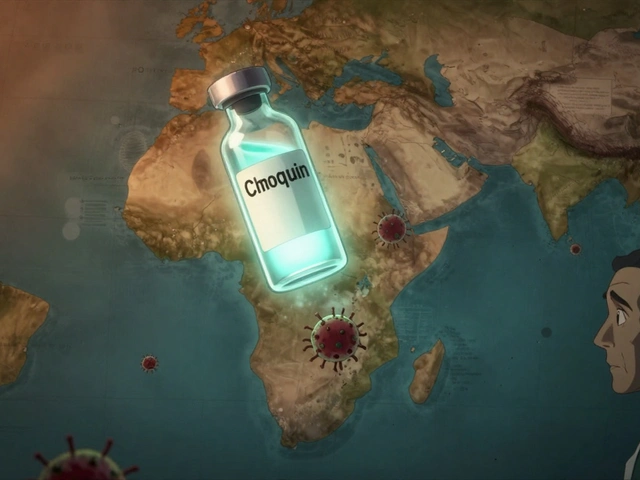Amebiasis is a parasitic infection caused by Entamoeba histolytica that primarily affects the large intestine. While most people think of the stomach cramps, bloody stools and fever, fewer realise that the illness can ripple into the mind, sparking anxiety, depression, and a lingering sense of stigma.
What Happens Inside the Body?
The Entamoeba histolytica is a single‑celled protozoan that invades the colonic wall, creating ulcers and sometimes spreading to the liver. Transmission occurs through contaminated water or food, especially in regions with poor sanitation. Acute episodes often resolve with Metronidazole treatment, a nitroimidazole drug that eliminates the trophozoite stage.
Physical Symptoms and Their Emotional Echo
Besides the classic diarrhoea and abdominal pain, patients may experience fatigue, weight loss, and fever. These physical stressors are a perfect breeding ground for psychological distress. The body’s inflammatory response releases cytokines that can alter neurotransmitter balance, a mechanism scientists link to mood changes in many infections.
Depression and Anxiety: Two Common Companions
The link between chronic infection and mood disorders is not new. Depression is a mental health condition marked by persistent sadness, loss of interest, and impaired daily functioning. When someone battles amebiasis, the unpredictability of symptoms can erode hope, leading to depressive episodes.
Anxiety manifests as excessive worry, restlessness, and physical tension. Fears about contagion, potential complications, and the social repercussions of a “dirty” disease often fuel anxious thoughts.
Stigma and Social Isolation
In many cultures, intestinal parasites carry a moral judgment-people assume poor hygiene or irresponsible behaviour. This stigma can isolate patients, making them reluctant to seek help or discuss their condition. Social withdrawal deepens the emotional toll, creating a feedback loop where isolation worsens mental health, and poorer mental health reduces the energy needed to adhere to treatment.

Quality of Life: A Broader Perspective
Quality of Life (QoL) measures physical, psychological, and social wellbeing. Studies from 2022‑2024 in South‑East Asia report that individuals with untreated amebiasis score 30% lower on mental health sub‑scales of the WHOQOL‑BREF questionnaire compared to healthy controls. Even after parasite clearance, a subset reports lingering fatigue and mood swings, suggesting that the psychological impact can outlive the infection itself.
Integrated Care: Bridging Medicine and Mind
Healthcare providers are now encouraged to screen amebiasis patients for depression and anxiety using brief tools such as the PHQ‑9 and GAD‑7. Early detection enables referrals to counselling, support groups, or psychiatric care. Combining antiparasitic therapy with psychosocial support improves treatment adherence and accelerates overall recovery.
| Parasite | Transmission | Typical Physical Symptoms | Standard Treatment | Known Psychological Impact |
|---|---|---|---|---|
| Amebiasis | Contaminated water/food | Bloody diarrhoea, abdominal pain | Metronidazole ± Paromomycin | Depression, anxiety, stigma |
| Giardia lamblia infection | Freshwater, untreated water | Foul‑smelling diarrhoea, bloating | Tinidazole or Nitazoxanide | Fatigue, mild anxiety |
| Cryptosporidiosis | Oocysts in water, animal contact | Watery diarrhoea, abdominal cramps | Supportive care; Nitazoxanide (immunocompetent) | Stress from chronic diarrhoea |
Related Concepts and Next Steps
The gut‑brain axis explains how intestinal health communicates with the central nervous system via neural, hormonal, and immune pathways. Dysbiosis caused by parasites can alter serotonin production, a key neurotransmitter for mood regulation. For readers intrigued by this, the next logical topics are “Microbiota and Mental Health” and “Managing Chronic Fatigue after Parasitic Infections.” Understanding health literacy-how well patients grasp medical information-also shapes their ability to seek help and adhere to treatment.
Practical Checklist for Patients and Clinicians
- Confirm diagnosis with stool microscopy or PCR.
- Start Metronidazole regimen as prescribed.
- Screen for depression (PHQ‑9) and anxiety (GAD‑7) at the first visit.
- Provide clear hygiene advice to prevent reinfection.
- Offer or refer to counseling, support groups, or mental‑health hotlines.
- Schedule follow‑up to reassess both parasitic clearance and mental‑health scores.

Frequently Asked Questions
Can amebiasis cause long‑term mental health problems?
Yes. Even after the parasite is cleared, some patients report lingering fatigue, low mood, and anxiety for months. Ongoing psychosocial support can mitigate these effects.
What are the main psychological symptoms people notice during an acute amebiasis episode?
Common symptoms include heightened worry about the disease spreading, feelings of shame or embarrassment, loss of appetite, and a pervasive low mood that can quickly evolve into clinical depression if not addressed.
How should doctors incorporate mental‑health screening into amebiasis treatment?
Screening tools like the PHQ‑9 for depression and GAD‑7 for anxiety are quick (5‑10 minutes) and can be administered during the initial consultation or at the first follow‑up. Positive screens warrant a referral to mental‑health services.
Is there a link between the gut microbiome and the mood changes seen in amebiasis?
Research from 2023 shows that Entamoeba histolytica disrupts the balance of beneficial bacteria, reducing short‑chain fatty acids that support serotonin synthesis. This gut‑brain disruption can contribute to anxiety and depressive symptoms.
What practical steps can patients take to protect their mental health during treatment?
Stay hydrated, follow the medication schedule, keep a symptom diary, reach out to trusted friends or support groups, and seek professional counseling if feelings of hopelessness arise. Simple mindfulness exercises can also reduce anxiety.








Posts Comments
Sadie Viner September 25, 2025 AT 15:26
In addressing the intricate relationship between amebiasis and mental health, it is essential to recognize the dual burden of physiological distress and psychological turmoil. By integrating routine PHQ‑9 and GAD‑7 screenings into clinical protocols, practitioners can proactively identify depressive and anxious symptomatology, thereby facilitating timely psychosocial interventions. Moreover, patient education regarding the gut‑brain axis elucidates how inflammatory cytokines may precipitate mood alterations, fostering a more comprehensive understanding of the disease process.
Kristen Moss September 29, 2025 AT 02:46
Honestly, folks, this whole gut‑brain thing is just another excuse for the media to hype up a simple infection. In the U.S. we have clean water, so the real problem is people not taking responsibility for their own health. Get your water filtered, wash your hands, and stop whining about a parasite you could have avoided.
Rachael Tanner October 2, 2025 AT 14:06
The mechanistic link between Entamoeba histolytica‑induced inflammation and neurotransmitter dysregulation can be framed within the broader context of cytokine‑mediated neuroimmune pathways. Specifically, elevated IL‑6 and TNF‑α levels have been shown to impair serotonin synthesis, thereby contributing to depressive phenotypes. This biochemical cascade underscores the necessity for adjunctive anti‑inflammatory strategies alongside antiparasitic regimens.
Debra Laurence-Perras October 6, 2025 AT 01:26
That's a solid point about cytokines, and it also highlights why community outreach is vital. When patients hear clear, jargon‑free explanations, they’re more likely to follow treatment plans and seek support groups. Providing culturally sensitive resources can break down stigma and empower individuals to discuss their experiences openly.
dAISY foto October 9, 2025 AT 12:46
Yo, think about how freakin’ crazy it is that a tiny protozoan can mess with your brain vibes! The gut‑brain axis is like a secret highway, and when it gets clogged, you feel all the gloom. Stay hydrated, keep that meds schedule tight, and don’t forget to breathe deep – mindfulness can be a game‑changer when your gut’s throwing a tantrum.
Ian Howard October 13, 2025 AT 00:06
Great reminder about mindfulness! Adding a brief daily meditation session has been shown to lower cortisol levels, which can buffer the stress response triggered by parasitic inflammation. Pair that with a balanced diet rich in prebiotic fibers, and you give your microbiome the best chance to rebound after treatment.
Chelsea Wilmer October 16, 2025 AT 11:26
The phenomenon of amebiasis‑related affective disturbances is not merely an incidental corollary of somatic malaise; rather, it constitutes a paradigmatic illustration of the somatopsychic interdependence that pervades contemporary nosology. First, the invasion of the colonic mucosa by Entamoeba histolytica initiates a cascade of pro‑inflammatory cytokines, notably interleukin‑1β, interleukin‑6, and tumor necrosis factor‑alpha, which traverse the blood‑brain barrier via active transport mechanisms, thereby perturbing the homeostatic equilibrium of central neurotransmitter systems. Second, the resultant dysregulation of serotonergic pathways manifests clinically as anhedonia, psychomotor retardation, and pervasive melancholia, echoing the diagnostic criteria delineated in the DSM‑5 for major depressive disorder. Third, the psychosocial ramifications, encompassing stigmatization and social withdrawal, amplify the neuroendocrine stress response, fostering a feedback loop wherein cortisol‑mediated hippocampal atrophy may further exacerbate cognitive deficits and mood lability. Moreover, the gut‑brain axis operates through bidirectional signaling involving vagal afferents, microbial metabolites such as short‑chain fatty acids, and the hypothalamic‑pituitary‑adrenal axis, thereby providing a mechanistic substrate for the observed anxiety phenotypes. In light of these intricate interrelations, a multidimensional therapeutic approach is indispensable: antiparasitic agents like metronidazole eradicate the pathogen, while adjunctive psychopharmacological interventions target neurotransmitter imbalances, and structured psychotherapy addresses the entrenched stigma and maladaptive cognitions. Finally, longitudinal research employing functional neuroimaging and microbiome sequencing is paramount to delineate the precise temporal dynamics of these interactions, which will inform precision medicine strategies in the future.
David Stout October 19, 2025 AT 22:46
That’s a thorough rundown, and it really drives home why we need to treat the whole person, not just the parasite. I’ve seen patients bounce back faster when we pair meds with short counseling sessions and peer support groups. It builds resilience and cuts down on relapse rates.
Pooja Arya October 23, 2025 AT 10:06
From an ethical standpoint, the moral condemnation of individuals suffering from intestinal parasites reflects a deep‑seated cultural bias that unjustly pathologizes poverty. In many societies, the label "dirty" becomes a weapon of social exclusion, reinforcing hierarchies and obstructing access to adequate healthcare. Such prejudice not only aggravates the psychological burden but also deters affected persons from seeking timely medical attention, perpetuating a vicious cycle of infection and marginalization.
Sam Franza October 26, 2025 AT 20:26
That's spot on.
Raja Asif October 30, 2025 AT 07:46
Look, the data is crystal clear: countries with robust sanitation infrastructure show dramatically lower rates of amebiasis‑related mental health issues. Blaming individuals is a distraction from the real problem – the need for national investment in clean water systems and public health education.
Matthew Tedder November 2, 2025 AT 19:06
Absolutely, systemic solutions are key. While individuals can adopt preventative habits, policy‑level interventions ensure that everyone, regardless of socioeconomic status, has access to safe water and mental health resources. Collaborative community programs can bridge the gap between clinical care and everyday life.
Cynthia Sanford November 6, 2025 AT 06:26
Hey, don’t forget that staying positive can actually boost your immune response. Little things like a good laugh or a chill playlist can make the treatment journey feel less daunting. Keep the vibes up, and the meds will do their job faster.
Yassin Hammachi November 9, 2025 AT 17:46
Indeed, optimism has measurable effects on cytokine profiles, and incorporating light‑hearted activities can complement pharmacotherapy. A balanced approach that respects both the biological and emotional dimensions of recovery tends to yield the best outcomes.
Michael Wall November 13, 2025 AT 05:06
It is morally imperative to admonish the neglect of basic sanitation, for neglecting such duties is tantamount to a societal sin. Simple measures, when ignored, lead to widespread suffering that could be avoided with modest effort.
Christopher Xompero November 16, 2025 AT 16:26
Honestly, the whole thing is a drama‑filled saga – a gut parasite playing the villain while we try to be the heroes. But, you know, the science is simple: kill the bug, fix the brain, repeat until the plot twists are over.
Irene Harty November 20, 2025 AT 03:46
One must consider the possibility that certain health narratives are orchestrated by entities seeking to control public perception; the emphasis on mental health screening may serve ulterior motives beyond genuine patient welfare.
Jason Lancer November 23, 2025 AT 15:06
Another overhyped approach – they keep pushing these screenings while ignoring the root cause: contaminated water. It's all a distraction.
lucy kindseth November 27, 2025 AT 02:26
If you’re looking for practical steps, start with a solid medication schedule, keep a symptom log, and don’t shy away from reaching out to a counselor if you notice mood drops. Small, consistent actions make a big difference.
Write a comment